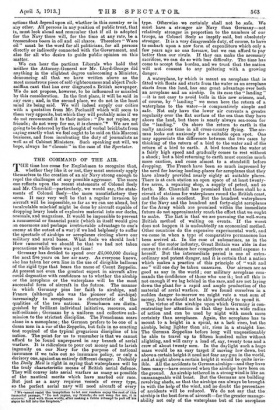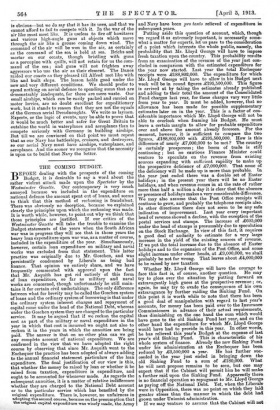THE COMMAND OF THE AIR.
THE time has come for Englishmen to recognize that, whether they like it or not, they must seriously apply themselves to the creation of an air Navy strong enough to repel the challenges of any possible aggressor. The more one reflects upon the recent statements of Colonel Seely and Mr. Churchill—particularly, we would say, the state- ments of Colonel Seely—the more unsatisfactory they seem. It may very well be that a regular invasion by aircraft will be impossible, so far as we can see ahead, but incalculable mischief might be done by aircraft capable of dropping heavy loads of explosive material into our docks, arsenals, and magazines. It would be impossible to prevent a commercial or financial panic (which in itself would give an enormous and perhaps irretrievable advantage to one's enemy at the outset of a war) if we had helplessly to suffer the spectacle of airships or aeroplanes circling above our military and naval bases. What fools we should look ! How remorseful we should be that we had not taken precautions while there was yet time !
Germany has decided to spend over £6,000,000 during the next five years on her air navy. As everyone knows, she has taken her own line in the use of dirigible balloons of the rigid type that bears the name of Count Zeppelin. At present not even the greatest expert in aircraft alive could dogmatize with confidence as to whether the airship or the aeroplane or the waterplane will be the most successful form of aircraft in the future. The manner in which Germany pins her faith to airships, and France (although she was the pioneer of airships) increasingly to aeroplanes is characteristic of the qualities of the two nations. Frenchmen are distin- guished by brilliant individual initiative, resource, and self-reliance ; Germans by a uniform and collective sub- mission to the strictest discipline. The Frenchman soars alone in a monoplane ; the German prefers to be one of a dozen men in a car of the Zeppelin, but fails in no exacting test required of the typical gregarious discipline of his nation. The point for us to remember is that we cannot afford to be found unprepared in any branch of aerial warfare. It is ridiculous to pour out money and to lavish ingenuity on our Navy for the purpose of national insurance if we take out no insurance policy, or only a derisory one, against an entirely different danger. Probably the Daily Mail is right in saying that wa.terplanes will be the truly characteristic means of British aerial defence. They will convey into aerial warfare as many as passible of the nautical merits which have marked our race. But just as a navy requires vessels of every type, so the perfect aerial navy will need aircraft of every 1, We "Annot resist the temptation to let our readers enjoy the rest of this immortal passage, '" Do not repine, my friends; do not weep for me, it is chrome.' And with these words, after making a futile attempt to pull off his skies ho fell into the fireplace." type. Otherwise we certainly shall not be .safe. We must have a stronger air Navy than Germany—not relatively stronger in proportion to the numbers of our troops, as Colonel Seely so ineptly said, but absolutely stronger. It is a very disagreeable duty, of course, to have to embark upon a new form of expenditure which only a few years ago no one foresaw, but we can afford to pay better than our rivals. If they can make the necessary sacrifices, we can do so with less difficulty. The time has come to accept the burden, and we trust that the nation will not consent to any paltering with a growing danger.
A waterplane, by which is meant an aeroplane that is fitted with floats and starts from the water as an aeroplane starts from the land, has one great advantage over both an aeroplane and an airship. In its case the " landing " —it is not easy to avoid bulls in this new science, and, of course, by " landing " we mean here the return of a wa.terplane to the water—is comparatively simple and safe. Not only have the lower air currents a greatei regularity over the flat surface of the sea than they have above the land, but there is nearly always sea-room for the "landing." On shore the return to earth is the really anxious time in all cross-country flying. The air- man looks out anxiously for a suitable open spot. One may appreciate the difference between the two cases by thinking of the return of a bird to the water and of the return of a bird to earth. A bird touches the water at a fairly high speed and gradually comes to rest without a shock ; but a bird returning to earth must exercise much more caution, and come almost to a standstill before dropping. The French have been so much impressed by the need for having landing-places for aeroplanes that they have already provided nearly eighty at suitable places. There is at each station an open space of at least twenty- five acres, a repairing shop, a supply of petrol, and so forth. Mr. Churchill has promised that there shall ba a circuit of stations for waterplaues round the British coast, and the idea is excellent. But the hundred waterplaues for the Navy and the hundred and forty-eight aeroplanes for the Army which are promised within the immediate future do not approximately reach the effort that we ought to make. The fact is that we are pursuing the well-worn British method of waiting on events. If the worst does not happen it is undoubtedly an economical method. Other countries do the expensive experimental work, and we come in when a type of comparative permanence has been arrived at. In the case of submarines, as in the case of the motor industry, Great Britain was able in duo course ta out-distance her competitors at small expense to herself. But the intermediate period is one of extra- ordinary and patent danger, and it is certain that a nation which makes a practice of this principle of "wait and see" will one day be taken unawares. Our airmen are as good as any in the world ; our military aeroplane com- mands the confidence of those who use it ; but all this is not enough if we lag behind in the race, and are not laying down the plant for a rapid and ample production of the material of aerial warfare. If we found ourselves in a sudden danger to-morrow we might vote a vast sum of money, but we should not. be able profitably to spend it. The virtue of the airships upon which Germany is con- centrating her attention is that they have a wide radius of action and can be used by night with much more certainty than aeroplanes. Again, the aeroplane has to mount to a height in a spiral, as a lark rises, but the airship, being lighter than air, rises in a straight line. The German Zeppelins before long will unquestionably be able to travel up to fifteen hundred miles without alighting, and will carry a load of, say, twenty tons and a crew of about twenty men. In the daylight such a huge mass would be an easy target if moving low down, but above a certain height it need not fear any gun in the world, and at night above a certain height it would be quite invis- ible. All the accidents to German airships—and they have been many—have occurred when the airships have been on the ground. An airship tethered in a strong wind is like an unmanageable wild beast. But the Germans are building revolving sheds, so that the airships can always be brought in with the help of the wind, and no doubt the percentage of accidents will be reduced. We do not say that the airship is the best form of aircraft—for the greater manage- ability not only of the waterplane but of the aeroplane is obvious—but we do. say that it has its uses, and that we cannot afford to fail to compete with it. In the war of the air like must meet like. It is useless to fire off howitzers and various high-angle guns at objects which move through the air like a grouse coming down wind. The command of the air will be won in the air, as certainly as the command of the sea is held at sea. Bricks and mortar on our coasts, though bristling with guns as a porcupine with quills, will not retain for us the com- mand of the sea ; and guns will not frighten away aggressors who use the air as their element. The Danes raided our coasts as they pleased till Alfred met like with like and built ships. The lesson bolds good under the new and very different conditions. We should prefer to spend nothing on aerial defence to spending sums that are demonstrably inadequate, for these are mere waste. Our small airships, which can be easily packed and carried on motor lorries, are no doubt excellent for expeditionary work, but it stands to reason that they are not the equals of the German aerial Dreadnoughts. We write as laymen. Experts, or the logic of events, may be able to prove that it would be much better and safer for Great Britain to outshine the world in waterplanes and aeroplanes than to compete seriously with Germany in building airships. But till we are convinced on that point we must repeat that as our Navy has battleships, cruisers, and destroyers, so our aerial Navy must have airships, waterplanes, and aeroplanes. And the sooner we recognize that the necessity is upon us to build that Navy the better.















































 Previous page
Previous page